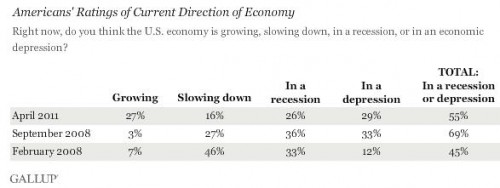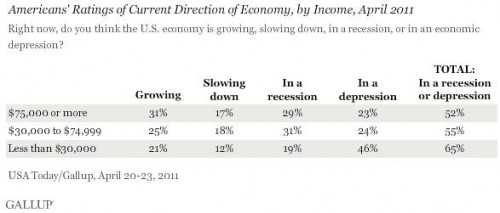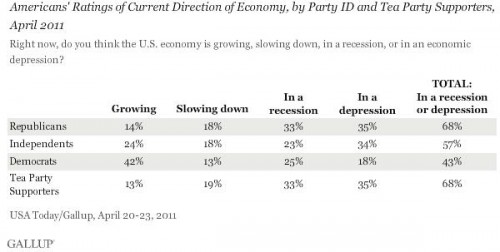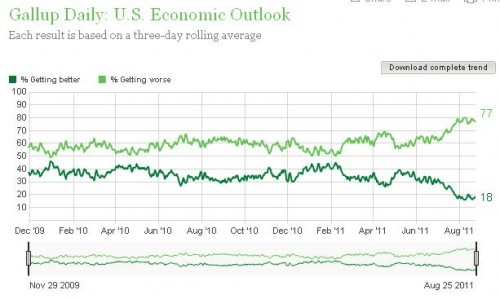We have posted a number of times about the unequal effects of the current economic crisis: the worsening of the racial gap in homeownership, the more severely negative economic situation of African Americans and Latinos than of Whites, including among African American and White college graduates, higher unemployment for men than for women (this post also has a lot of info about race, sex, and job loss), the fact that older workers who lose their jobs remain unemployed longer than younger workers, that job losses have been accompanied by increased corporate profits, and that wealthier households have weathered the crisis better than less prosperous ones.
Dmitriy T.M. sent along an April 2011 Gallup poll that asked 1,013 Americans about their perceptions of the economy. Overall, results were more positive than when the same question was asked in September 2008, when the economic meltdown really became apparent. Though more than half of respondents said the U.S. is in either a recession or a depression, that’s down significantly from the 69% who said so in late 2008, while the 27% who said the economy is growing is an enormous jump compared to the mere 3% who thought it was in September 2008:
But perceptions of the economy differed significantly by income level. Nobody thought it was doing great; over half of every income group still thought the economy was in either a recession or a depression. However, those making less than $30,000 a year had a notably more negative outlook on the economy than those with higher incomes. Not only were they more likely to think the economy is doing poorly, but nearly half thought we’re experiencing a depression — twice as high as the proportion of those making $75,000/year who thought so:
Interestingly, perceptions of the economy also varied widely by political affiliation, with Democrats feeling much more positive about the economy than any other group, and Republicans and Tea Party supports feeling markedly more negative:
Meanwhile, the Gallup daily tracker poll on the state of the economy (which only shows overall results) shows a marked downturn in Americans’ perceptions of the economy throughout the summer of 2011, with 77% now reporting the economy is “getting worse”:
For more on the economic crisis and its uneven effects, see Philip Cohen’s post on race and job loss, differences in optimism about the future, unemployment by race/sex/education, occupation, median earnings, and race, and the geography of job loss.





Comments 8
Partisan Perceptions in Economic Polling Data « A (Budding) Sociologist’s Commonplace Book — August 30, 2011
[...] has an excellent post today about perceptions of the economy based on an April, 2011 Gallup poll. Some of the interesting [...]
Public Perceptions of the State of the Economy And More « Welcome to the Doctor's Office — August 30, 2011
[...] PUBLIC PERCEPTIONS OF THE STATE OF THE ECONOMY by Gwen Sharp, [...]
Rachel Ann Hanson — August 31, 2011
I find it especially interesting that people on the right admit a recession/depression in high numbers.
31.8.11 Afternoon List « Analytically Eclectic — August 31, 2011
[...] Sociological breakdown of perceptions of the economy http://thesocietypages.org/socimages/2011/08/30/public-perceptions-of-the-state-of-the-economy/ [...]
Nedion — July 19, 2024
Accept it as a fact. Most of the world's population does not understand financial flows at all. Living from paycheck to paycheck as a life model is addictive and discourages you from thinking outside the box. I was very glad when the topic of crypto came into big business. People began to evaluate their capabilities and financial risks differently.
Robert Wilson — July 19, 2024
I personally was greatly helped by the fact that modern technologies are constantly improving the ability to use additional tools to control one’s finances. I'm used to using multifunctional applications like here - https://nonbank.io/ Just one gadget will not give you financial benefits, but it will greatly facilitate and speed up both ordinary routine transactions and serious investments. This is the first time that a bank-crypto exchange link works 100%
Haxton Pierce — June 3, 2025
Nel 2025, FxPro continua a essere una delle scelte più solide per i trader grazie alla sua affidabilità, all'esecuzione veloce degli ordini e alla regolamentazione rigorosa. È particolarmente adatto a chi cerca un'esperienza di trading professionale. Per una panoramica completa e aggiornata, consiglio di leggere questa recensione: https://tradersunion.com/it/brokers/forex/view/fxpro/. Utile sia per chi inizia sia per chi ha già esperienza!
Haxton Pierce — June 3, 2025
https://tradersunion.com/it/brokers/forex/view/fxpro/